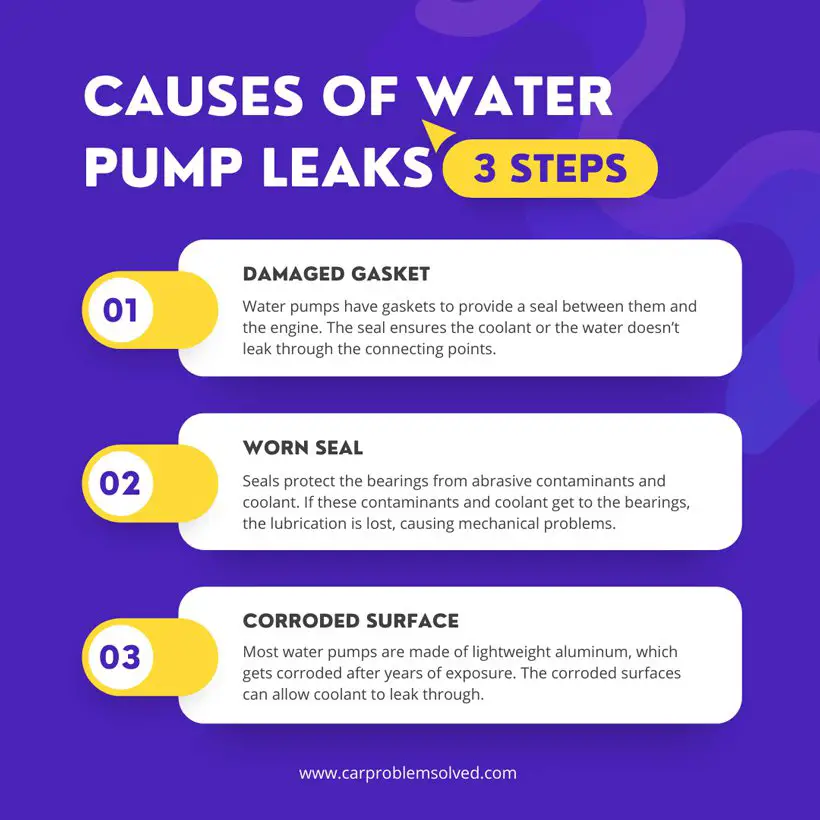Among the problems drivers experience with their cars include issues with the cooling system. Specifically, the water pump, which plays a major role in cooling, is known to develop problems causing issues.
For instance, if your vehicle is overheating without getting overloaded or the heater doesn’t work, it may be leaking. While these problems can have other causes, the pump is always the first culprit and needs immediate checking to avoid further damage.
However, to be certain that the water pump is leaking, perform a diagnosis. The article provides a guide on the diagnosis and how to provide solutions. Also, read on to learn the causes and solutions of the water pump leaking coolants.
The Importance of the Water Pump in the Cooling System
Every part of the cooling system plays a major role in ensuring the engine stays cool. The water pump is among the crucial parts and is known as the heart of the cooling system. It uses the engine’s power through the engine’s timing belt, serpentine drive belt, or gear to circulate the coolant.

Accordingly, the coolant comes in through the radiator after running back from the engine block, cooling it.
When the pump is faulty, the coolant remains in the radiator and does not flow through the system as expected. And without a circulating coolant, the engine overheats, which can cause damage to the piston or the engine block.
Symptoms of A Leaking Water Pump

There are several leaking water pump symptoms that you can use to tell the problem. They include;
- Engine overheating as it doesn’t receive enough cooling from the system
- The heater in the car blows in the cold air instead of the warm air
- There is a puddle of leaked coolant on the garage floor
- There are whining noises from the vehicle
If you notice any of the above signs, the best thing would be contacting your technician for diagnosis and repair.
Diagnosing Water Pump Leaks
Water pump failures are common once the vehicle gets over 40,000 miles, but if well-maintained, can be over 100,000 without the problems. However, since there are multiple parts involved in the cooling system, you can’t be sure until you diagnose it.

Diagnosing water pump leaks includes;
1. Inspecting for Coolant Leaks
Visually look for leakages on the water pump to spot a coolant leak. The coolant leaks from worn-out gaskets and should be the first place you look. However, direct impact on the pump can cause damage and allow leakages.
2. Looking for Rust and Corrosion
Check for rust and corrosion on the exterior sides of the pump, which is a sign of an ongoing leakage. Rust on corrosion happens when the coolant leaks on a metal surface. Look carefully, as the hoses may be causing the leakages.
3. Listening for Unusual Noises
A failing water pump is among the causes of coolant leakages and is known to cause noises. The noises come from the pulleys or belts, which are either too loose or worn out. Listen for these buzzing noises to tell whether your pump may be leaking.
Causes of Water Pump Leaks
The following are some of the common causes of water pump leakages

1. Damaged Gasket
Water pumps have gaskets to provide a seal between them and the engine. The seal ensures the coolant or the water doesn’t leak through the connecting points.
However, the gasket gets damaged after some time, allowing the coolant to leak. Gaskets on the water pump get damaged by corrosive coolant or if too much paste is used during installation. Also, incorrectly installed gaskets can develop problems and allow leaks.
2. Worn Seal
Seals protect the bearings from abrasive contaminants and coolant. If these contaminants and coolant get to the bearings, the lubrication is lost, causing mechanical problems. Worn seals allow the coolant to leak through them into the engines.

3. Corroded Surface
Most water pumps are made of lightweight aluminum, which gets corroded after years of exposure. The corroded surfaces can allow coolant to leak through. Contaminated coolants are the main causes of corrosion on water pumps.
Solutions for Addressing Water Pump Leaks
Now that you know what might be causing the water pump leaks, it’s time to address these issues. The solutions include the following;

1. Replacing the Gasket
The solution to a damaged gasket is to replace them with a new one. You can do the replacement or get a professional to do it for you. Follow the steps below;
Step 1: Drain the coolant from the cooling system from the coolant drain underneath
Step 2: Disconnect any part hindering your access to the water pump
Step 3: Disconnect the coolant lines connected to the water pump
Step 4: Open the screws holding the pump to the engine
Step 5: Clean the metal surfaces of the engine before reinstalling
Step 6: Remove the old gasket and replace it with a new one
Step 7: Reinstall the pump and tighten the bolts to the ideal torque as per your vehicle specifications
Step 8: Reinstall the parts you removed earlier
Step 9: Top up the coolant
2. Replacing the Seal
If the leakages on your water pump are due to a worn-out seal, you can replace it or get a professional to handle the replacement. To replace, follow the steps above to remove the water pump from the engine. Afterward, follow the steps below to replace the seal.
Step 1: Remove the polymer impeller
Step 2: Remove the faulty mechanical seal
Step 3: Install the new seal and attach it to the integral bearing
Step 4: Reinstall the impeller

3. Repairing the Corroded Surface
Use vinegar and distilled water to wipe the corroded surfaces on the water pump. You can also use a water and lemon juice mixture on the corroded surface to remove the corrosion and stop leaking.
Preventive Maintenance Tips for Avoiding Water Pump-Related Problems
Repairing water pump problems is costly and takes much time, especially if you do it instead of a mechanic. For instance, replacing water pump gaskets can cost between $45 and $75, depending on the car.

Following are some preventive maintenance and tips to avoid these problems.
Regular Maintenance
Regular and on-time maintenance is one way to avoid water pumps and other problems. During the maintenance, the mechanics can spot developing pump problems and help you repair them on time.
Coolant System Checks
The coolant system involves a lot of heating and cooling and is more prone to developing problems. Therefore, one way to ensure the water pump and other related issues don’t occur is by regularly checking it.
Monitoring Temperature Gauge
Overloading and overworking the engine are among the causes of water pump-related problems. To avoid these problems, monitor the temperature gauge to know when you’re overworking your car’s engine.
When dealing with a water pump leaking coolant, it’s essential to address the issue promptly to prevent further damage to your vehicle’s cooling system. Additionally, understanding how to remove water from your car’s coolant tank and being aware of potential coolant leakage after replacing the water pump are valuable pieces of information. Our article on how to remove water from your car’s coolant tank provides step-by-step instructions to help you effectively remove water and maintain the proper coolant balance in your vehicle. Furthermore, if you’re experiencing coolant leakage after replacing the water pump, our article on coolant leaking after replacing water pump offers insights into potential causes and troubleshooting steps to address this issue. By exploring these related topics, you can better manage coolant-related concerns and ensure the optimal functioning of your vehicle’s cooling system.Conclusion
Some people top up the coolant instead of fixing the leaking problem, which can cost them fortunes in repair. If the leaking continues, it can cause the engine to overheat and damage some of its parts permanently.
Luckily, the article provides a guide from diagnosing to telling whether your problem is a leaking coolant or not. Also, you will learn the possible causes, how to fix them, and ways to avoid the problems in the future.
